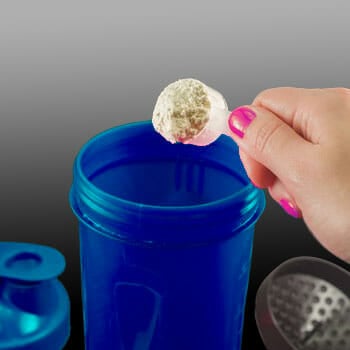Creatine is one of the most reliable health supplements for increasing power, size, and lean muscle mass, which is why athletes of all types consider it the gold-standard supplement.
Taking it pre and post-workout is pretty much established, but there is some debate over whether taking creatine before bed is good or not.
Is it safe to take at night? Will it affect your ability to fall asleep?
Read along for detailed information.
Quick Summary
- Taking creatine before bed is generally safe, with no clear evidence suggesting it negatively affects sleep, making it a viable option for fitness enthusiasts.
- Creatine helped sleep-deprived athletes perform similarly to the effects of caffeine.
- A recent study published in PubMed Central discovered that creatine supplementation had a similar effect to caffeine in enhancing athletic performance.
- In my opinion, the effectiveness of creatine largely depends on personal preferences and individual reactions, so it's advisable to find what works best for you.
Does Creatine Affect Your Sleep?

In my experience, creatine didn't affect my sleep, though there's no definitive evidence linking it to sleep disturbances. Its impact varies from person to person.
Despite common beliefs that taking creatine at night is harmful, research from PubMed Central indicates it can lessen the impact of sleep deprivation [1].
A study found that creatine, like caffeine, can boost performance in sleep-deprived athletes [2]. Its antioxidant properties, particularly effective against exercise-induced oxidative stress, might be more beneficial if taken before bed.
Taking creatine at night is generally safe, but individual responses differ. Experiment to find your best routine. If evening creatine affects your sleep, consider training in the morning and supplementing post-workout.
Remember, supplement use often involves trial and error. Ultimately, do what works best for you.
Related: Does Creatine Expire
When Is The Best Time To Take Creatine?

From personal trial and error, I realized there is no best time to take creatine; what’s more important is for you to take it consistently and at the right dosage. Research in PubMed Central shows that taking creatine both before and after workouts can boost its effectiveness [3].
Taking it 30 minutes before training allows absorption time, potentially enhancing lifting power and muscle gains.
"Supplementation with creatine serves to increase creatine stores and phosphocreatine availability in the body, resulting in faster ATP formation. Bottom line: The more phosphocreatine you have, the more work you can accomplish before fatigue sets it."
- Ciaran Fairman, Ph.D., Exercise Physiologist
Post-workout creatine helps muscles recover quickly, as they're primed to absorb nutrients then.
For overnight muscle-building, mix creatine with casein protein and complex carbs. Casein's slow digestion aids protein absorption during sleep, while complex carbs enhance creatine absorption through insulin interaction.
How To Take It?

During my athletic performance focus, I followed a creatine loading phase of 20 grams daily for 4-7 days, split into four 5g servings throughout the day.
Post-loading, I reduced the intake to a maintenance dose of 2-5 grams daily, maintaining optimal levels and avoiding a deficit.
For muscle strength, a similar approach is advised: a 20g daily loading phase for 5-7 days, followed by a 2-5 grams maintenance dose [4].
You can mix creatine with your morning smoothie, pre-workout meal, or post-evening workout drink during the loading phase. If skipping the loading phase, maintain a steady 2-5 grams daily, on both training and rest days.
What Is Creatine, And How Does It Work?

Creatine monohydrate, naturally produced in the body using glycine, methionine, and arginine, is crucial for muscle energy. Your liver, kidneys, and pancreas generate about 2g daily.
Supplementing with creatine is particularly beneficial for those engaged in weight training and high-intensity workouts, as per PubMed Central [5].
Here's why: during weightlifting, muscles use adenosine triphosphate (ATP) for energy, which depletes quickly. Creatine steps in, providing an energy boost to enhance exercise performance, increase strength, and aid recovery.
It's especially useful in power sports like football, wrestling, hockey, and bodybuilding. While immediate strength and muscle gains aren't evident, creatine helps you perform extra reps, contributing to muscle mass over time.
Learn what the difference is between creatine and whey protein and how they both work.
Taking creatine supplements has also been shown to possess brain-boosting abilities, i.e., improving short-term memory and intelligence/reasoning of healthy individuals [6].
Any Side Effects?

Creatine is one of the safest supplements on the market, as determined by a study on long-term creatine supplementation published in PubMed [7].
According to the Cleveland Clinic, you may experience potential weight gain as a side effect because of increased water retention in your muscles [8]. However, keep in mind that this added weight isn’t fat; it’s just water.
Let's also touch on potential side effects, like kidney or liver damage, providing a balanced view and safety guidelines for those considering creatine supplementation before bed.
While there’s no data to prove that creatine supplements cause any significant adverse side effects, you should steer clear of them if you have diabetes, bipolar disorder, or a history of kidney disease [9].
Consider consulting your doctor before you take creatine to be on the safe side, especially if you're already taking other supplements or medicines.
Factors To Consider When Choosing A Creatine Supplement

Here’s how to choose the best creatine supplement for your fitness goals.
- Opt for Creatine Monohydrate: This form of creatine is the most researched and proven effective. Other forms like ethyl ester, anhydrous, and citrate lack sufficient scientific evidence regarding their efficacy and safety and are often more expensive.
- Prefer Powder Over Other Forms: Creatine is unstable in liquid form and can break down in your bloodstream. Pills require taking multiple capsules to reach the recommended dosage. Micronized creatine powder, which dissolves easily in water, is a good choice.
- Avoid Unnecessary Extra Ingredients: Some creatine supplements include added electrolytes like sodium or magnesium, which can increase the cost without enhancing the effects of creatine. If you want electrolytes, consider mixing creatine powder with a sports drink or fruit juice, as the sugar content can help increase creatine uptake into muscles.
- Look for NSF Certification: Since the FDA doesn't evaluate supplements, check for the NSF's "Certified for Sport" mark. This certification ensures the product is safe, high-quality, and effective.
References:
- https://pubmed.ncbi.nlm.nih.gov/16416332/
- https://www.ncbi.nlm.nih.gov/pmc/articles/PMC3049131/
- https://pubmed.ncbi.nlm.nih.gov/17095924/
- https://medlineplus.gov/druginfo/natural/873.html
- https://pubmed.ncbi.nlm.nih.gov/14636102/
- https://www.ncbi.nlm.nih.gov/pmc/articles/PMC6093191/
- https://pubmed.ncbi.nlm.nih.gov/12701816/
- https://my.clevelandclinic.org/health/treatments/17674-creatine
- https://www.mayoclinic.org/drugs-supplements-creatine/art-20347591
About The Author
You May Also Like






